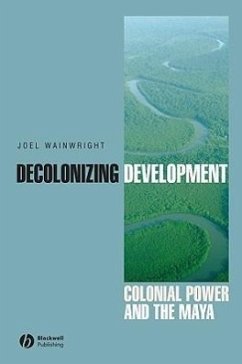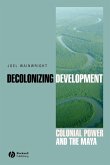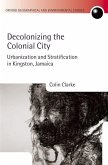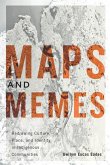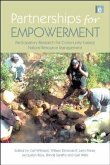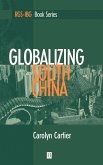Postcolonialism and political economy are brought together in this groundbreaking book to examine development among the Maya of Belize. Decolonizing Development investigates the ways colonialism shaped the modern world by analyzing the relationship between colonialism and development. Through close readings of archival texts, maps, and development practices, Joel Wainwright unearths the roots of centuries of struggle over the representation of the Maya and their lands. He traces the shifts in discourses on this pre-Columbian civilization and documents indigenous resistance to the British colonial state. The politics of state-led development projects since the 1950s are explored through three case studies: the works of a soil scientist who served the British colonial state in Belize; two agricultural development projects that intended to settle Maya agriculture by improving mechanized rice production; and a 'counter-mapping' project that offers an indigenous view of the geography of southern Belize. Wainwright demonstrates how development - a stage upon which colonial struggles are replayed - sustains the very power inequalities it aims to resolve.
Hinweis: Dieser Artikel kann nur an eine deutsche Lieferadresse ausgeliefert werden.
Hinweis: Dieser Artikel kann nur an eine deutsche Lieferadresse ausgeliefert werden.
"Wainwright is to be applauded for marshalling his considerableintellectual skills to advancing our understanding of Maya colonialexperiences (past and present) in the confines of Belize."(Social & Cultural Geography, February 2009)
"Theoretically sophisticated ... .It has some important thingsto say that are relevant to both scholars and practitionersconcerned with development practices in the South today."(Geographical Journal, 2009)
"Culture studies sometimes receive a hasty, often incoherentintroduction ... .Fortunately, this book is an exception.Wainwright provides a meticulous and actually readable explanationof the culture studies 'manifesto.' One of the interesting issuesdiscussed was the Mayas' 'development' into settled farming, asopposed to their original milpa (i.e., slash and bum) agriculture.Recommended." (CHOICE, December 2008)"Drawing on philosophy and political theory and a close studyof Belize, Wainwright provides a startlingly original reading ofdevelopment and its others. He shows how recognizing the nationalterritoriality of developmental discourses highlightsoft-overlooked continuities between colonialism and globalization,and forces us to reconsider the relation between metropolitancapitalism and its contestations."
-Eric Sheppard, Department of Geography, University ofMinnesota
"Joel Wainwright has produced a wide-ranging andpenetrating critique of development in Belize, which puts empiricalmeat on the bones of postcolonial, critical, and discursivetheories. Sophisticated and deeply researched, this case study willhave broad appeal. It speaks to the political and economic problemsof indigenous people, and to the way these troubles are intertwinedwith the academic obsession with studying thesegroups."
-Richard Wilk, Department of Anthropology, IndianaUniversity
"Theoretically sophisticated ... .It has some important thingsto say that are relevant to both scholars and practitionersconcerned with development practices in the South today."(Geographical Journal, 2009)
"Culture studies sometimes receive a hasty, often incoherentintroduction ... .Fortunately, this book is an exception.Wainwright provides a meticulous and actually readable explanationof the culture studies 'manifesto.' One of the interesting issuesdiscussed was the Mayas' 'development' into settled farming, asopposed to their original milpa (i.e., slash and bum) agriculture.Recommended." (CHOICE, December 2008)"Drawing on philosophy and political theory and a close studyof Belize, Wainwright provides a startlingly original reading ofdevelopment and its others. He shows how recognizing the nationalterritoriality of developmental discourses highlightsoft-overlooked continuities between colonialism and globalization,and forces us to reconsider the relation between metropolitancapitalism and its contestations."
-Eric Sheppard, Department of Geography, University ofMinnesota
"Joel Wainwright has produced a wide-ranging andpenetrating critique of development in Belize, which puts empiricalmeat on the bones of postcolonial, critical, and discursivetheories. Sophisticated and deeply researched, this case study willhave broad appeal. It speaks to the political and economic problemsof indigenous people, and to the way these troubles are intertwinedwith the academic obsession with studying thesegroups."
-Richard Wilk, Department of Anthropology, IndianaUniversity

